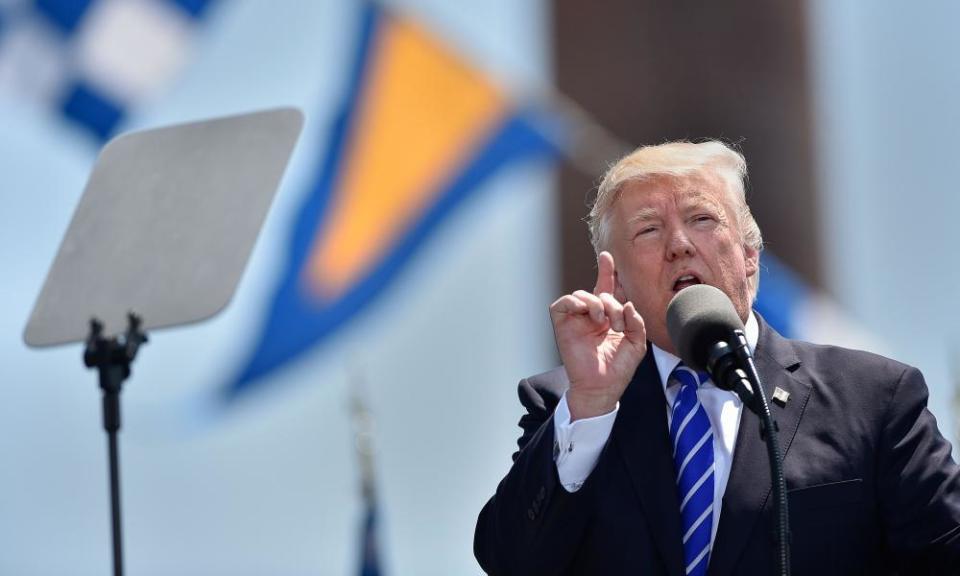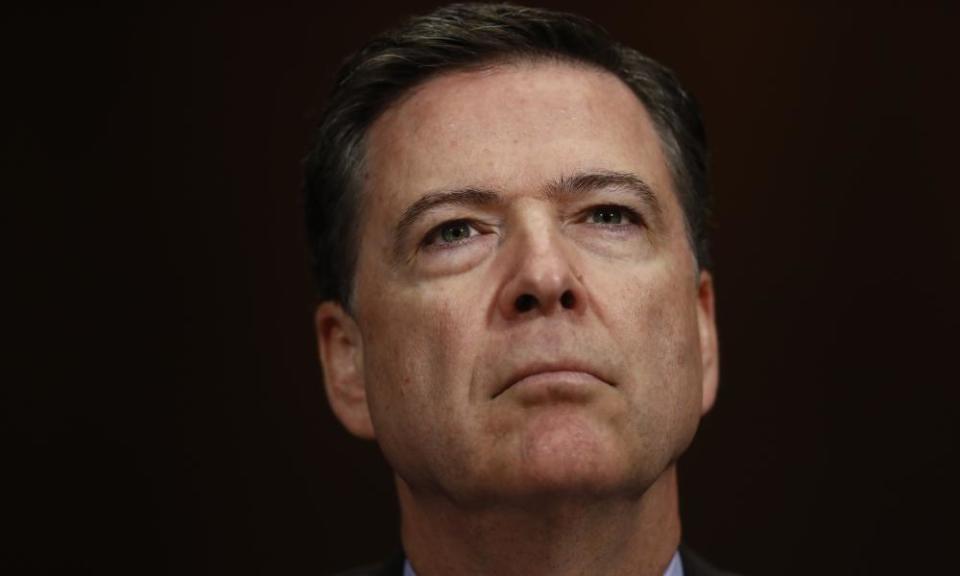'Witch hunt': Trump appears at odds with White House over Robert Mueller
White House statement welcomed ex-FBI director’s appointment to oversee the Trump-Russia investigation, while the US president lashed out on Twitter

Donald Trump on Thursday said he was the target of the “greatest witch hunt” in US political history after a decision by the Department of Justice to appoint special counsel to investigate ties between his 2016 presidential campaign and Russia.
The morning after FBI director Robert Mueller accepted the appointment to lead the department’s investigation into Russian intervention in the US election, Trump lashed out in a pair of tweets.
“With all of the illegal acts that took place in the Clinton campaign and Obama administration, there was never a special councel [sic] appointed!” he wrote in the first tweet. He later corrected the spelling of counsel. “This is the single greatest witch hunt of a politician in American history!”
Later in the day, Trump said the appointment of a special counsel was a “very negative thing” that “hurts our country terribly because it shows we’re a divided, mixed-up, not unified country”.
“It also happens to be a pure excuse for the Democrats, having lost an election that they should have easily won because of the electoral college being slanted so much in their way – that’s all this is,” Trump told television news anchors during a briefing on Thursday afternoon, according to transcripts posted by several attendees. “I think it shows division, and it shows that we’re not together as a country.”
The commentary marked a shift from the White House statement released after the announcement, which welcomed Mueller’s appointment as an opportunity to resolve the questions raised by his campaigns ties to Russia.
“As I have stated many times, a thorough investigation will confirm what we already know – there was no collusion between my campaign and any foreign entity,” the Wednesday night statement said.
The decision by the deputy attorney general, Rod Rosenstein, to appoint Mueller came after a week of stunning developments, including Trump’s abrupt dismissal of FBI director James Comey, who was leading the agency’s Russia investigation.
It also followed reports that Trump had asked Comey to shut down an investigation into his national security adviser Michael Flynn, who resigned in February after misleading the vice-president about his contacts with Russian officials.
As the White House scrambled to contain the fallout from a week of damaging developments, a fresh series of reports on Wednesday and Thursday raised more questions about the ties between Trump and Russia.
A report from the New York Times alleged that Flynn had told the president’s transition team weeks before being appointed that he was under federal investigation for working, in secret, as a paid lobbyist for Turkey.
Asked about that on Thursday, spokespeople for Mike Pence’s office issued a statement that read: “The vice-president stands by his comments in March upon first hearing the news regarding General Flynn’s ties to Turkey, and fully supports the president’s decision to ask for General Flynn’s resignation.” In March, Pence said about Flynn’s work for Turkey: “Hearing that story today was the first I heard of it.”
McClatchy on Wednesday reported that Flynn had intervened to stop a military plan to retake Raqqa, the Islamic State’s de facto capital, with Syrian Kurdish forces – a move consistent with the wishes of Turkey.
On Thursday, Reuters reported that the Trump campaign had at least 18 undisclosed contacts with Russian operatives, several more than previously reported.
Rosenstein will be on Capitol Hill this week to brief members of Congress on the circumstances of Comey’s firing. Trump initially presented a letter from Rosenstein as a central factor in the president’s decision to fire Comey. Trump then undermined that explanation by saying he had already decided to dismiss the FBI chief before hearing from Rosenstein.
Rosenstein will brief the Senate on Thursday in a private meeting, and return to the Hill on Friday to brief the House.
A bipartisan chorus of lawmakers have also called on Comey to testify publicly in the wake of the report that Trump had pressured him to stop the investigation into Flynn, a request that Comey reportedly noted in a memo circulated with senior staff.
The Senate intelligence committee, one of two congressional committees investigating Russian interference, has asked Comey to testify before the committee in both public and private sessions. The committee has also sent a request to acting FBI director Andrew McCabe “seeking any notes or memorandum prepared by the former director regarding any communications he may have had with senior White House and Department of Justice officials related to investigations into Russia’s efforts”.

Senator Mark Warner, a Virginia Democrat and the vice-chair of the Senate intelligence committee, remarked dryly that lawmakers were certainly “not lacking for questions”.
“We’ve got questions about the president’s comments about tapes – secret tapes – we have question about transcripts from the meetings with the Russians, and we have questions about obtaining former director Comey’s memo and that’s just Wednesday,” he said.
Special counsel is a position that exists under a statute that allows the attorney general or a deputy, if the attorney general is recused, to mount an independent investigation. This particular provision has been invoked only once before, in the Bill Clinton administration, when former Senator John Danforth was to investigate the Branch Davidian siege outside Waco, Texas.
The position is different from an independent counsel, the role in which Ken Starr investigated Bill Clinton throughout the 1990s. The law authorising that position expired in 1999.
As special counsel, Mueller will command broad powers, including the power to subpoena documents and prosecute any crimes, independent of Congress. Calls on Capitol Hill for a special prosecutor in the investigation have percolated for months, but spiked after the firing of Comey, who was leading an FBI investigation into the matter. The independence of the investigation fell into question after the firing.
Democrats, who had called for a special counsel, welcomed Mueller’s appointment, along with a number of Republicans who have come to view the near daily revelations as an obstacle to their legislative agenda.
But some in the GOP expressed concern that the appointment conveyed the wrong message.
“There should be the most special circumstances when you have an independent prosecutor – you should have evidence for a crime,” said New York representative Peter King, a Republican, who argued the appointment was unnecessary.
“There’s no evidence of collusion at all,” King added said. “Just a rabid press corps and a very intense Democratic Party.”
On a day of fast-moving developments, Richard Burr, the chairman of the Senate intelligence committee, said a lawyer for Flynn had told the intelligence committee that his client would not comply with the panel’s subpoena for personal documents related to the committee’s own probe.
Flynn, through his lawyer, had earlier asked for immunity from “unfair prosecution” in exchange for agreeing to cooperate with the committee.
But the committee later seemed to correct Burr’s comments, saying it had not yet received a response from Flynn’s lawyer.
If Flynn were to refuse to honor the subpoena, that could leave him in contempt of Congress, but the Republicans on the Senate intelligence committee would decide how far to push Flynn to get him to comply.
“If he’s really saying the equivalent of ‘nuh-uh,’ it’s really hard to see how Burr can justify not treating that as contempt,” said Josh Chafetz, a Cornell University law professor and expert on congressional investigations. “That would be saying that, ‘Every subpoena we issue is completely optional.’”
“Subpoenas aren’t optional, so it’s contempt of Congress,” he added. Contempt of Congress has been a federal crime since the 19th century, Chafetz said.
Before the committee finds someone in contempt, “usually, there’s an attempt to negotiate and come to some sort of settlement”, said Chafetz.
Additional reporting by Tom McCarthy, Jon Swaine and Ben Jacobs

